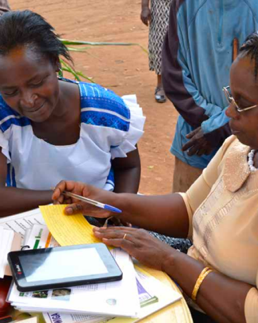Farming First is pleased to act as media partner for the Louis Malassis International Scientific Prize and the inaugural Olam Prize for Innovation in Food Security. Our new blog series will showcase stories from groups nominated for these prestigious prizes.
The fourth blog in this series outlines the work of Plantwise, nominated for the Olam Prize for Innovation in Food Security.
Plantwise: Lose less, feed more
Each year, an estimated 30-40% of crops are lost to pests worldwide – these include crops which over 500 million smallholder farmers depend on for food and income to support their families. Reducing crop loss by just 1% could potentially feed millions more people- but ensuring this is done in a safe and sustainable way would benefit not only farmers, but also consumers and the environment.
“Invasive pests do not respect borders,” says Dr. Ulrich Kuhlmann, Programme Executive of Plantwise, the group nominated for the inaugural Olam Prize for Innovation in Food Security. “Farmers are struggling to cope with the ongoing spread of pest problems due to climate change and global trade. The knowledge is available today to safely reduce crop loss through integrated pest management, but in many countries the resources and linkages between farmers and advisory support aren’t there. So the crop loss continues.”
In order to meet the nutritional needs of a growing global population we must reduce this loss. Farmers must have the support they need to identify and manage pests before livelihoods are threatened.
Plantwise: an innovative approach to plant health
Since 2012, Plantwise has been working to change the story. With national partners- over 168 worldwide, and counting- the programme helps establish plant clinics, similar to those for human health, where farmers find advice to manage and prevent crop problems. “It serves to provide help for the government,” says Komayombi Bulegyeya, Commissioner for Crop Protection in Uganda. “We lose 20-30% of crops before harvest, but with plant clinics we can extend knowledge to farmers.”
National extension staff like Martin Busobozi in Rwanda are trained as plant doctors to identify any problem on any crop, and provide appropriate recommendations guided by best practice standards. They use ‘green and yellow lists’ developed by CABI and national experts to provide non-chemical recommendations first, and reduce risks of pesticides when there are no other options.

The CABI-led Plantwise programme provides answers to a devastating problem facing smallholders today: plant pests.
Behind the scenes, the Plantwise Knowledge Bank supports plant clinics with information and innovation, creating tools like the Plantwise Factsheet Library mobile app, SMS extension, and a new serious game to improve plant doctor diagnostic skills anywhere in the world. Training from the Knowledge Bank turns plant clinics into mines for useful data to inform extension, research, policy, and the private sector on emerging plant health issues. “The importance of this knowledge from plant clinics is that it also helps bring awareness of new diseases. Maize Lethal Necrosis was first brought in by farmers in Northern Rwanda and now we’re working fast to control the spread,” says Bellancile Uzayisenga from the Rwandan Agricultural Board.
Impact, sustainability, scale up
Farmers see the benefits. “I have doubled my profit since visiting the plant clinic,” reports George Kanyagari whose coffee was diagnosed with coffee berry disease by the local plant doctor in Wangige, Kenya. Since getting advice about new pruning techniques, George was able to remove the disease and restore yield and quality. “I have built a nice house.”
https://vimeo.com/69534946
Rice paddy farmer Valli Kuppuswamy lost her entire crop in a cyclone near Puducherry, India. She went into debt buying new seeds and inputs, but during the next harvest her crop again turned yellow and started dying. She was not sure what the problem was or how to proceed. “When I visited the plant clinic, I found hope again to continue in agriculture,” comments Valli.
https://www.youtube.com/watch?v=zeLz0u6sZJI
With this advice, farmers can lose less of what they grow and ultimately help feed their family, their community and the global food supply chain. But what is the use of improving a harvest for only one year? “The plant clinics, and the benefits they bring to farmers, must be deeply rooted in the national system,” says Dr. Kuhlmann. “That is why Plantwise works as a programme, not a one-off project. National partners increase support year on year because they see the value of plant clinics, and the relevance of plant clinic data to help manage pest outbreaks.”
Benefits are spreading, but there is more to be done. Plantwise has now reached over 600,000 farmers in 34 countries, and aims to reach more than 30 million farmers by 2020 with knowledge to fight pests.
“The work that we do is ultimately aimed at improving the livelihoods of smallholder farmers in developing regions by building new bridges to agricultural knowledge,” says Dr Kuhlmann. “If Plantwise wins this award, it would show that organisations like Olam recognize the important difference which access to plant health information can make in the everyday lives of farmers, especially those in remote and rural areas where Plantwise and partners work.”
The winners of the Louis Malassis International Scientific Prize and Olam Prize for Innovation in Food Security, will be announced at the Third Global Science Conference on Climate Smart Agriculture on 16th March, 2015.




